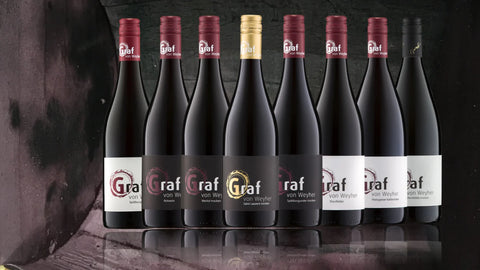Phenols: What (the hell) are they?

Some people love chemistry. Others glaze over at the mere mention of the word "molecule" and are unpleasantly reminded of school. Let's see if we can explain the whole phenol thing to even the chemistry-avoiding among you in a way that will convince you to read this post to the end—at least, that's our stated goal!
Phenols are incredibly important to us winemakers. They 're essentially the wine itself, as they determine the color, aroma/taste, texture (how the wine feels in the mouth), and shelf life. If you remove these four characteristics, there's really not much left of a wine...
Chemically speaking, phenols are a specific group of organic compounds. There are around two hundred of them in wine. Perhaps that's why they're called polyphenols, meaning "many phenols" ;-). Just like a school class, polyphenols are highly reactive (in other words, constantly changing). Today we'll focus on a subgroup of polyphenols, the flavonoids , and take a closer look at some of them.
To keep your head from falling on the table , let's stick with the school class image. Remember: In every class, there are stars that everyone knows and others that are obscure and lost in the crowd. It's no different with flavonoids.
The flavones are the nerds. A solid base, always well-behaved, unobtrusive, pale, and when they come into contact with water, they dissolve immediately. Otherwise, they're good for just about anything.
Anthocyanins are the artists who masterfully handle color, as they determine the berry's color. The more anthocyanins present, the darker the berry becomes. This protects the kernel from UV light.

Photo: Here the anthocyanins have really gone to town!
And then of course there are the rowdies with their bitter nature . We bet you've heard of this flavonoid rowdy before? We're talking about tannin , which is a hallmark of red wine in particular. "Tanin" is French and means tannin, and that's exactly what it is. Tannin is found in the grape skin, the seeds and the stems. It's no wonder then that white wine can't boast about it, because these parts are removed from it right from the start, whereas red wine ferments with the grape skin and thus develops its friendship with the tannin in peace. Tannin is odorless and tastes rather bitter on the tongue, but is what gives red wine its great flavor expressiveness. The catechins , which you may have heard of before, are also among these rowdy tannins (a rival gang, so to speak).
Overall, the entire class is an absolute model class , the favorite of all the teachers. Flavonoids are said to have a number of beneficial properties: They're said to have anti-inflammatory, antispasmodic, cancer-preventive, and vascular-strengthening effects—and are also powerful antioxidants, which, as we all know, you can never get enough of.
So, bring on the wine? Many medical experts have already debated this topic. The discussion, by the way, goes by the amusing name " The French Paradox. " The whole world is desperately wondering why the French, who drink outrageous amounts of wine and eat fatty butter, have approximately 20% fewer strokes than Americans or Germans. That can't be right! The reason (who would be surprised after reading this newsletter) is supposedly the beneficial properties of flavonoids. However, this hasn't been conclusively proven yet, so for now, we all have to decide for ourselves what amount of wine is good for us...🍷🍷🍷
Many flavonoid greetings from your counts
P.S. The chemists and biologists among you may forgive us. Yes, we've oversimplified things. But seriously—who likes chemistry?
PPS And to drive the chemists completely crazy, here is the voice from the "off":
The only elements you need :-)












Sehr schön erklärt! Wenn das mein Chemielehrer so gemacht hätte…..
vielen Dank für für einen so amüsanten Start in den Tag, der Bericht über die Phenole ist einfach klasse, großes Lob, das wollte ich mal rückmelden!!! 😃
Einfach n u r köstlich, auch dieser Beitrag wieder!!! Glückwunsch zur Darstellung komplexer Zusammenhänge und chemischer Vorgänge in so anschaulicher Form. Nur zum Freuen, wirklich. – Und frau möchte sich gleich eine Flasche Wein öffnen. 😂🥰
Ihr macht das wirklich ganz toll. Mit großem Interesse habe ich über die Phenole gelesen. Eine leichte humorvolle Kost die begeistert und das Verständnis von Wein fördert. Kompliment!
Leave a comment